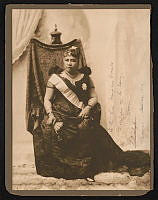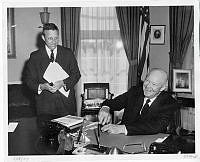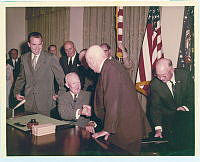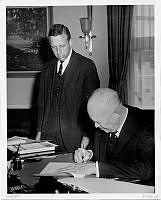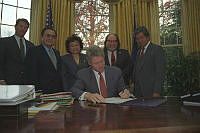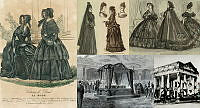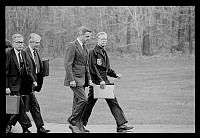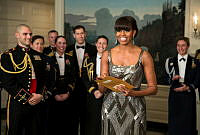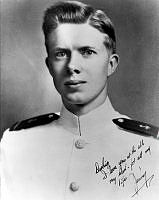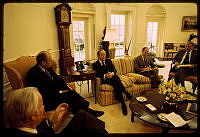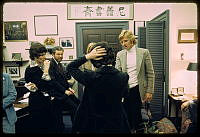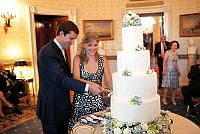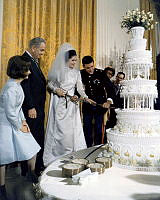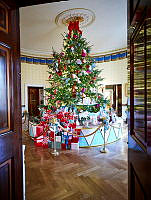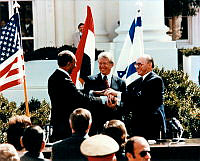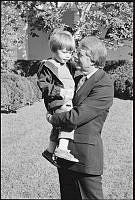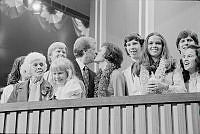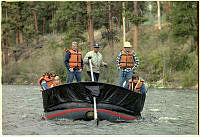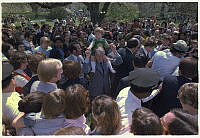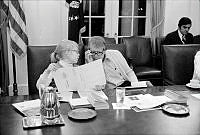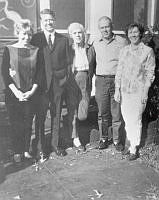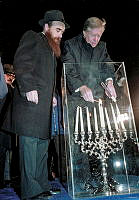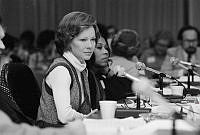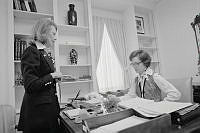Rubenstein Center Scholarship
A Kinder Quiet Sense of Humor
Will Rogers and the Coolidge White House
Will Rogers is one of the most beloved American celebrities of the twentieth century. Born in 1879 in Oklahoma, Rogers was a true Renaissance man of the era. Best known for his political satire which reached millions of readers through his syndicated newspaper columns, Rogers also acted in vaudeville and starred in film and on radio. The American public loved his humorous interpretations of politicians and current events across the political spectrum. Always approachable and outgoing, Rogers was personal friends with many major political figures of his day. Today his statue represents Oklahoma in the National Statuary Hall Collection on Capitol Hill.1

Erected in 1939, this statue of Will Rogers represents the state of Oklahoma in the National Statuary Hall in the Capitol Building. Tradition maintains it is good luck to rub his shoes while passing.
Architect of the CapitolWill Rogers is also connected to the history of the White House, which he visited several times during the Calvin Coolidge administration. His articles resulting from these visits confirmed Rogers' cultural influence in American politics.2

Will Rogers: comedian, newspaper columnist, film and radio star, political satirist.
On April 23, 1925, Rogers arrived at the White House accompanied by his friend Nicholas Longworth. Longworth was the current Speaker of the House of Representatives and husband of Alice Lee Roosevelt, Theodore Roosevelt's daughter. Rogers was in Washington, D.C. for the Gridiron Club Dinner, an annual white-tie gathering held by the prestigious Washington press organization. Rogers described his meeting with President Coolidge in his unique style, which poked fun at politics without offending politicians themselves. Of Coolidge, Rogers wrote, “I had never met him. That is I never had unless it was when he was Vice President and one seldom ever remembers meeting a Vice President.” Rogers also commented on the scene inside the White House. He wrote, “There was so many people waiting to see the President that it looked like the Casting Office of a Hollywood Movie Studio . . . The lawn was full, the house was full; the more select was in the Private Secretary’s office.”3 After exchanging several light-hearted jokes and a brief conversation with President Coolidge, Longworth supposedly told Rogers that was the most talkative he had ever seen the president.4

Will Rogers with Representative Nicholas Longworth on the day of their April 23, 1925 visit to the White House. Related to the Roosevelt family through marriage; Longworth served as Speaker of the House from 1925 to 1931.
In 1926, Rogers’ popularity was rising and his columns appeared in well-known magazines across the country.5 President Coolidge invited Rogers to the White House as an overnight guest and on September 30, 1926, Rogers arrived at the White House. The Coolidges were just sitting down for their evening meal. He had planned on arriving sooner, but his train had been delayed. During dinner, Rogers told the first family about his recent trip to Europe. Afterward they relocated to a nearby sitting room where President Coolidge and Rogers worked on several jigsaw puzzles. First Lady Grace Coolidge, meanwhile, worked on a knitting project. At approximately 10:25 p.m., Rogers and the Coolidges retired for the evening. Rogers slept in guest room consisting of a large bedroom, a bathroom, and a dressing room with a small bed in it; Rogers chose to sleep in the smaller bed in the dressing room. The next day, Rogers took an airplane from Washington, D.C. back to New York.6
On August 2, 1927 President Coolidge announced he would not seek reelection. While Americans discussed Coolidge’s decision, Rogers responded in usual form. Writing as the “Official Presidential House Examiner,” Rogers identified recent White House renovations as “just another one of the dozen things that makes me know he is going to run again.”7 Despite Rogers’ humorous prediction, Coolidge remained committed to not seek reelection.

President Calvin Coolidge watches the progression of renovation work at the White House in 1927. President Coolidge’s interest in repairing and renovating the upper floors and attic of the White House led to speculation among the public, including Will Rogers, that Coolidge intended to run for president in 1928.
Rogers recalled his visit to the White House as cordial and said, “ I am the only person of Democratic leanings to have slept in the White House for a long time. …The President is a nice enough fellow with a sense of humor. We spent last night sitting in the living room telling yarns. About 8 o’ clock the president began to yawn and at 10 o’ clock he fell asleep.”8 White House Chief Usher Irwin “Ike” Hoover claimed in his 1934 memoirs that Rogers exaggerated the story of his 1926 overnight White House visit. While Rogers claimed that President Coolidge fell asleep on him, Hoover maintained that before retiring for the night, President Coolidge escorted Rogers to his guest room before himself turning in for the night.9
President Coolidge exhibited little outward enthusiasm about meeting Rogers. When asked if he got a “good kick” out of the visit, Coolidge responded, “Oh, Will! He is all right.”10

Throughout his career, Rogers befriended many individuals associated with the White House. In this 1922 photograph taken in Washington, D.C., Rogers poses with Theodore Roosevelt Jr. and Alice Longworth, the children of former President Theodore Roosevelt.
Rogers’ White House pieces were popular and presented to readers a glimpse of “Silent” Cal’s personality and humor, which Rogers described as a “kinder quiet sense.”11 Rogers observed President Coolidge in his role as president as well as a private individual. Later in life, Rogers reflected, “I have had many Republican politicians tell me, ‘Will, you are one of Mr. Coolidge’s best boosters.’ Well I did like him. I could get a laugh out of almost all the little things he said, but at the same time they were wise. He could put more in a line than any public man could in a whole speech.”12













